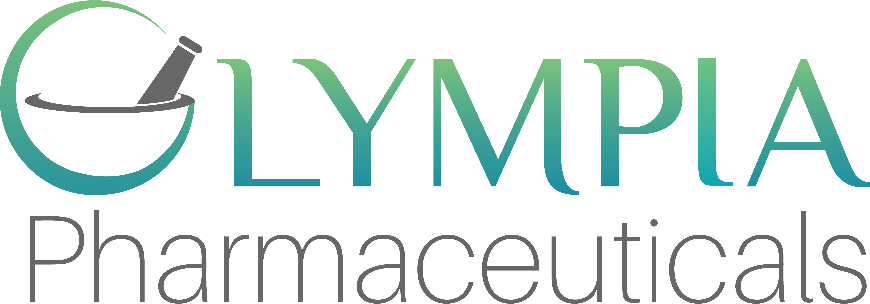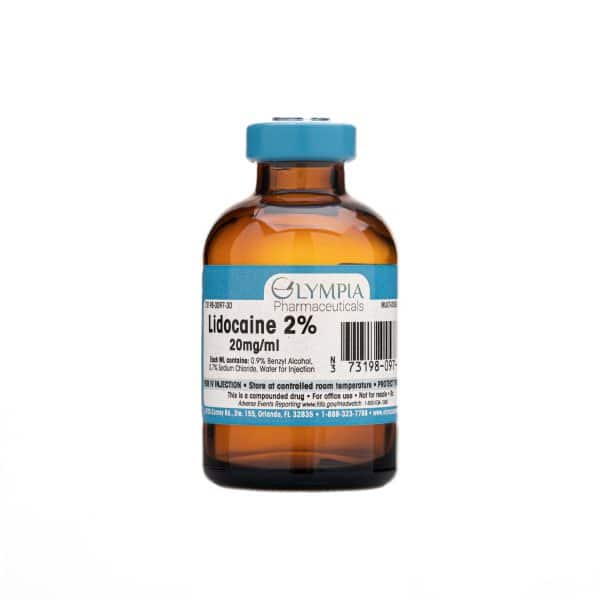Overview
Lidocaine HCl 2% is an anesthetic commonly used to numb specific areas of the body, thereby reducing pain and discomfort during various medical procedures. This medication is available in several different formulations, including creams, patches, lotions, sprays, gels and liquids, providing flexibility in its administration. However, Lidocaine HCl 2% injections are typically administered by healthcare professionals just before a procedure to ensure optimal pain relief.
Lidocaine is a local anesthetic that works by inhibiting the transmission of nerve signals in the targeted area. It blocks voltage-gated sodium channels, preventing the influx of sodium ions into nerve cells and inhibiting the generation and conduction of nerve impulses. This action effectively interrupts the transmission of pain signals, resulting in temporary numbness and alleviation of pain.
What Is Lidocaine HCl 2% Injectable Used For?
Lidocaine HCl 2% injection is primarily used to relieve pain and discomfort by numbing the targeted area of the body into which it is injected. The anesthetic properties of lidocaine help block nerve signals, preventing the transmission of pain sensations to the brain. As a result, lidocaine injections are frequently employed before dermatological and vein procedures to minimize pain during these interventions.
In dermatology, lidocaine HCl 2% injections are commonly employed to provide local anesthesia before various procedures. These procedures may include skin biopsies, mole removals, excisions of cysts or tumors and cosmetic interventions like laser treatments or dermal filler injections. Lidocaine injections effectively numb the treatment area, allowing dermatologists to perform these procedures with reduced discomfort for the patient.
Lidocaine HCl 2% injections are also used before vein procedures to alleviate pain and improve patient comfort. Vein procedures often involve the insertion of needles or catheters into veins, such as during venipuncture, intravenous (IV) catheterization or sclerotherapy. By administering lidocaine injections, healthcare professionals can numb the area around the veins, making these procedures more tolerable for patients.
Dosage, Concentration, Route of Administration
Dosage: Seek advice from a licensed physician, medical director or other healthcare provider
Concentration: 20mg/ml (10mg/ml also available)
Route of Administration: IM/IV/Sub-Q
Precautions/Side Effects
Before using lidocaine HCl 2% injections, inform your doctor about any allergies you have, including allergies to other anesthetics like bupivacaine or prilocaine. Inactive ingredients in the medication may cause allergic reactions or other complications. Discuss your medical history, particularly if you have cuts, sores or bleeding in the intended injection area or if you have a history of heart problems, kidney disease, liver disease or methemoglobinemia, a specific blood disorder.
Lidocaine injections may lead to dizziness, drowsiness or vision issues. Refrain from driving, operating machinery or engaging in activities requiring alertness or clear vision until you can do so safely. Limit alcohol consumption and consult your doctor before using marijuana, as it can potentiate the effects of the medication. Inform your doctor about all medications or supplements you are taking.
If you are pregnant or breastfeeding, consult your doctor before using lidocaine HCl 2% injections.
Some common side effects include:
- – Mild nausea
- – Stinging
- – Swelling
- – Burning
Some serious side effects may include:
- – Dizziness
- – Drowsiness
- – Slow/shallow breathing
- – Mental/mood changes (such as confusion/nervousness)
- – Shaking
- – Seizures
- – Vision changes (double vision/blurred vision)
- – Ringing in the ears
- – Fainting
- – Pale/bluish/grey skin
- – Fast/slow/irregular heartbeat
Although allergic reactions are rare, seek immediate medical attention if you experience any of the following:
- – Rash
- – Itching
- – Swelling of the face, tongue or throat
- – Severe dizziness
- – Trouble breathing
Storage
Store at controlled room temperature. Protect from light.
Ready to Learn More About Lidocaine HCl 2%? Contact Olympia Pharmacy Today!



